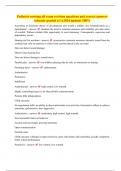-
1. Exam (elaborations) - Pediatric nursing all exam revision questions and correct answers (already graded a+)...
-
2. Exam (elaborations) - Pediatric nursing mid--term exam overview. the best midterm exam revision questions a...
-
3. Exam (elaborations) - Ati pediatric nursing. sample exam revision practice questions with correct answers (...
-
4. Exam (elaborations) - Maternity and pediatric nursing end exam revision all exam revision questions and cor...
-
5. Exam (elaborations) - Pediatric nursing: cardiovascular. sample exam revision practice questions with corre...
-
6. Exam (elaborations) - Pediatric nursing: pharmacology. sample exam revision practice questions with correct...
-
7. Exam (elaborations) - Pediatric nursing – adolescent. all exam revision questions and correct answers (al...
-
8. Exam (elaborations) - Pediatric nursing all exam revision questions and correct answers (already graded a+)...
-
9. Exam (elaborations) - Pediatric nursing all exam revision questions and verified correct answers (already g...
-
10. Exam (elaborations) - Pediatric nursing all revision questions and correct answers (graded 100%) (2024 upda...
-
11. Exam (elaborations) - Pediatric nursing best 136 revision questions and answers. exam revision questions an...
-
12. Exam (elaborations) - Pediatric nursing development sample midterm exam revision practice questions with co...
-
13. Exam (elaborations) - Pediatric nursing end exam questions - all exam revision questions and correct answer...
-
14. Exam (elaborations) - Pediatric nursing end semester exam- all revision questions and correct answers (grad...
-
15. Exam (elaborations) - Pediatric nursing exam 1. all exam revision questions and correct answers (already gr...
-
16. Exam (elaborations) - Pediatric nursing exam 2 questions and answers. all exam revision questions and corre...
-
17. Exam (elaborations) - Pediatric nursing exam #2. all exam revision questions and correct answers (already g...
-
18. Exam (elaborations) - Pediatric nursing exam assessment all exam revision questions and correct answers (al...
-
19. Exam (elaborations) - Pediatric nursing exam 1. all first exam revision questions and correct answers (alre...
-
20. Exam (elaborations) - Pediatric nursing midterm exam questions and answers. - all exam revision questions a...
-
21. Exam (elaborations) - Pediatric nursing exam revision all revision questions and correct answers (graded 10...
-
22. Exam (elaborations) - Pediatric nursing exam revision practice questions and answers. top revision question...
-
23. Exam (elaborations) - Pediatric nursing exam #2. all mid-term revision questions and correct answers (grade...
-
24. Exam (elaborations) - Pediatric nursing examination 2. exam revision questions and correct answers for exam...
-
25. Exam (elaborations) - Pediatric nursing examination revision all exam revision questions and correct answer...
-
26. Exam (elaborations) - Pediatric nursing examination revision questions and answers. all exam revision quest...
-
27. Exam (elaborations) - Pediatric nursing first exam question and answers. all exam one revision questions an...
-
28. Exam (elaborations) - Pediatric nursing growth and development. all exam revision questions and correct ans...
-
29. Exam (elaborations) - Pediatric nursing guide all exam revision questions and correct answers (already grad...
-
30. Exam (elaborations) - Pediatric nursing; immunizations. all midterm exam revision questions and correct ans...
-
31. Exam (elaborations) - Pediatric nursing infancy. all midterm exam revision questions and correct answers (g...
-
32. Exam (elaborations) - Pediatric nursing infant immunization midterm exam revision questions and correct ans...
-
33. Exam (elaborations) - Pediatric nursing infants. midterm exam revision questions and correct answers (grade...
-
34. Exam (elaborations) - Pediatric nursing midterm exam revision. all midterm exam revision questions and corr...
-
35. Exam (elaborations) - Pediatric nursing midterm exam revision practice questions and answers. top revision ...
-
36. Exam (elaborations) - Pediatric nursing midterm exam revision questions and correct answers (graded a+) (10...
-
37. Exam (elaborations) - Pediatric nursing midterm exam revision questions. all correct midterm exam revision ...
-
38. Exam (elaborations) - Pediatric nursing – midterm exam revision questions. midterm exam revision question...
-
39. Exam (elaborations) - Pediatric nursing midterm. sample exam revision practice questions with correct answe...
-
40. Exam (elaborations) - Pediatric nursing – midterm exam revision questions. top midterm exam revision ques...
-
41. Exam (elaborations) - Pediatric nursing pharmacology. all exam revision questions and correct answers (alre...
-
42. Exam (elaborations) - Pediatric nursing midterm exam revision. all midterm exam revision questions and corr...
-
43. Exam (elaborations) - Pediatric nursing practice exam revision - all exam revision questions and correct an...
-
44. Exam (elaborations) - Pediatric nursing midterm exam revision practice questions and answers. top revision ...
-
45. Exam (elaborations) - Pediatric nursing midterm exam revision questions and correct answers (graded a+) (10...
-
46. Exam (elaborations) - Pediatric nursing midterm exam revision questions. all correct midterm exam revision ...
-
47. Exam (elaborations) - Pediatric nursing midterm. sample exam revision practice questions with correct answe...
-
48. Exam (elaborations) - Pediatric nursing – midterm exam revision questions. top midterm exam revision ques...
-
49. Exam (elaborations) - Pediatric nursing pharmacology. all exam revision questions and correct answers (alre...
-
50. Exam (elaborations) - Pediatric nursing practitioner exam all exam revision questions and correct answers (...
-
51. Exam (elaborations) - Pediatric nursing – respiratory sample exam revision practice questions with correc...
-
52. Exam (elaborations) - Pediatric nursing revision- all exam revision questions and correct answers (already ...
-
53. Exam (elaborations) - Pediatric nursing (diseases) sample exam revision practice questions with correct ans...
-
54. Exam (elaborations) - Pediatric nursing sample exam revision practice questions with correct answers (2024 ...
-
55. Exam (elaborations) - Pediatric nursing (diseases) sample exam revision practice questions with correct ans...
-
56. Exam (elaborations) - Pediatric nursing toddler all exam revision questions and correct answers (already gr...
-
Show more




